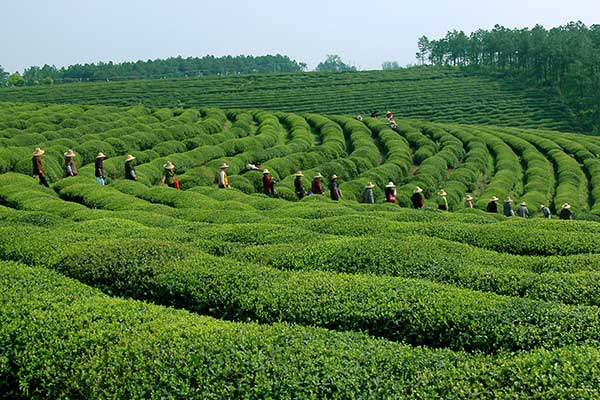Go slow
 |
|
Farmers pick tealeaves in a tea plantation in Yaxi county in Nanjing.[Photo provided to China Daily] |
"The Slow City designation is earning more recognition at home and abroad, especially among people in major metropolises, who endure mounting pressure from work, traffic and soaring property prices," Zhang says.
The concept originated in Italy in 1999 with the motto, "slow for a better life".
It's rooted in such ideas as slow food - a counter movement to fast-food culture - that also originated in Italy and has spread around the globe since the '80s.
Founder Carlo Petrini published a manifesto that says people are enslaved by speed, which disrupts normal life. So, they should return to healthy home-cooked fare made from homegrown ingredients.
The Slow City initiative is essentially slow-food values extended to the entirety of life.
"We achieve the ideal of good living by slowing down and rediscovering our identity, our territory and our local culture," Cittaslow explains on its website.
The global network has expanded to 236 cities in 30 countries and regions over the past 18 years.
The standards are strict. They cover traffic, production, culture, technology and lifestyle.
The Chinese branch's guidelines say a candidate's population shouldn't exceed 50,000. Vehicles should drive no faster than 20 kph downtown. And fast food restaurants' presence are discouraged.
"There can't be companies in scenic belts. Incomes should be based on green agriculture and tourism," says Wang Jianye, head of Yaxi's tourism bureau and deputy director of the management committee of Yaxi's Gaochun Slow City, China's first settlement to win the designation.
Yaxi's six villages cover 50 square kilometers with a 48-km-long scenic belt.
Its poky pace hasn't hurt its economy. It has instead helped sustainable development, Wang says.
Residents in Yaxi's Dashan village earned about 7,900 yuan ($1,200) on average in 2010, before the award. They've earned nearly 30,000 yuan this year, committee data show.
















